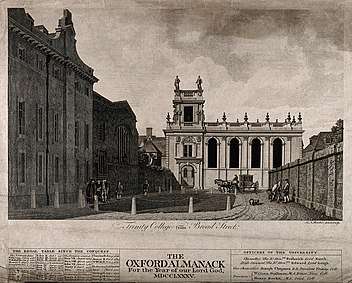Thomas Short (physician)
Thomas Short (1690–1772)[1] was an English physician, epidemiologist, and medical historian.[2] He is known for writing extensively on population theory and the history of disease outbreaks affecting England.[1]

Life and career
A draft deed indicates Thomas Short was the son of a merchant named James Short. From an early point in Thomas's life he was interested in chemistry and mineral water,[1] and as a young man was educated in medicine at Trinity College in Oxford.[3] After his studies he either practiced medicine or was counseled in Coventry from 1723 to 1728, and Short began officially working as a physician in Sheffield around 1725 or 1728.[1] He published books about what he learned as a doctor treating patients. One of Short's earliest publications, in 1728, was medical literature on the negative health effects of obesity: In A Discourse concerning the causes and effects of Corpulency, etc he writes about how fat separates from the blood and why some individuals are more vulnerable to health problems than others.[4]
Short was at a prolific stage of writing medical literature by the 1740s. Retaining his interest in mineral waters from early in his life, he began the decade by publishing An Essay Towards a Natural, Experimental, and Medicinal History of the Principle Mineral Waters.[5] In 1746, he published Medicine Britannica: Or, a Treatise on such Physical Plants as are Generally to be Found in the Fields or Gardens in Great Britain.[6] One of his more famous works was published at the end of the decade in 1749, A General Chronological History of the Air, Weather, Seasons, Meteors, &c., in Sundry Places and Different Times: More Particularly for the Space of 250 Years: Together with Some of Their Most Remarkable Effects on Animal (especially Human) Bodies and Vegetables.[2] His descriptions of sixteenth century influenza pandemics in Europe, their pathologies, and recorded treatments have been cited by medical historians.[7][8][9] Short's works were also read by contemporaries such as Benjamin Franklin.[1]
In 1750, at age 60, Short had his Discourses on Tea, Sugar, Milk, Made-Wines, Spirits, Punch, Tobacco with Plain and Useful Rules for Gouty People published.[10] The same year he also published New Observations, Natural, Moral, Civil, Political, and Medical, on City, Town, and Country Bills of Mortality,[11] his first publication where Short focused his demographic interests[1] discussing how diseases affected and altered populations. This was the checkpoint in his literary career where he became known for his writings on population theory.[1]
In 1762, Short moved to Rotherham, where he lived for 10 years before dying in 1772.[1]
References
- Jones, G. P. (1956). "Dr. Thomas Short, an Eighteenth-Century Writer on Population". Bulletin of Economic Research. 8 (2): 149–158. doi:10.1111/j.1467-8586.1956.tb00467.x. ISSN 1467-8586.
- Short, Thomas (1749). A General Chronological History of the Air, Weather, Seasons, Meteors, &c. in Sundry Places and Different Times: More Particularly for the Space of 250 Years : Together with Some of Their Most Remarkable Effects on Animal (especially Human) Bodies and Vegetables. London: T. Longman ... and A. Millar.
- Fletcher, Hanslip (1910). Oxford and Cambridge. London: Sir Isaac Pitman and Sons, Limited. p. 122.
- Short, M.D., Thomas (1728). A Discourse concerning the causes and effects of Corpulency, etc. London. p. 8.
- Short, M.D., Thomas (1740). An Essay Towards a Natural, Experimental, and Medicinal History of the Principle Mineral Waters of Cumberland, Northumberland, Westmoreland ...: To which is Added, a Short Discourse on Cold and Tepid Bathing, and a Table of the Temperature ... ; Being the Second Volume of The Mineral Waters of England. John Garent.
- Short, Thomas (1746). Medicina Britannica : Or, A Treatise on Such Physical Plants as are Generally to be Found in the Fields Or Gardens in Great-Britain: Containing a Particular Account of Their Nature, Virtues, and Uses ... R. Manby and H. Shute Cox.
- Reynolds, Sir John Russell (1880). A System of Medicine: General diseases and diseases of the nervous system. Philadelphia, PA: H.C. Lea's Son & Company. p. 34.
- Thomson, Theophilus (1852). Annals of Influenza or Epidemic Catarrhal Fever in Great Britain. The Sydenham Society Instituted. pp. 3–4. Retrieved 14 March 2020.
- Morens, David M; North, Michael; Taubenberger, Jeffery K (2010-12-04). "Eyewitness accounts of the 1510 influenza pandemic in Europe". Lancet. 376 (9756): 1894–1895. doi:10.1016/s0140-6736(10)62204-0. ISSN 0140-6736. PMC 3180818. PMID 21155080.
- Short, Thomas (1750). Discourses on Tea, Sugar, Milk, Made-wines, Spirits, Punch, Tobacco, &c: With Plain and Useful Rules for Gouty People. T. Longman and A. Millar.
- Short, Thomas (1750). New Observations, Natural, Moral, Civil, Political, and Medical, on City, Town and Country Bills of Mortality. ...: With an Appendix on the Weather and Meteors. London: T. Longman, and A. Millar.